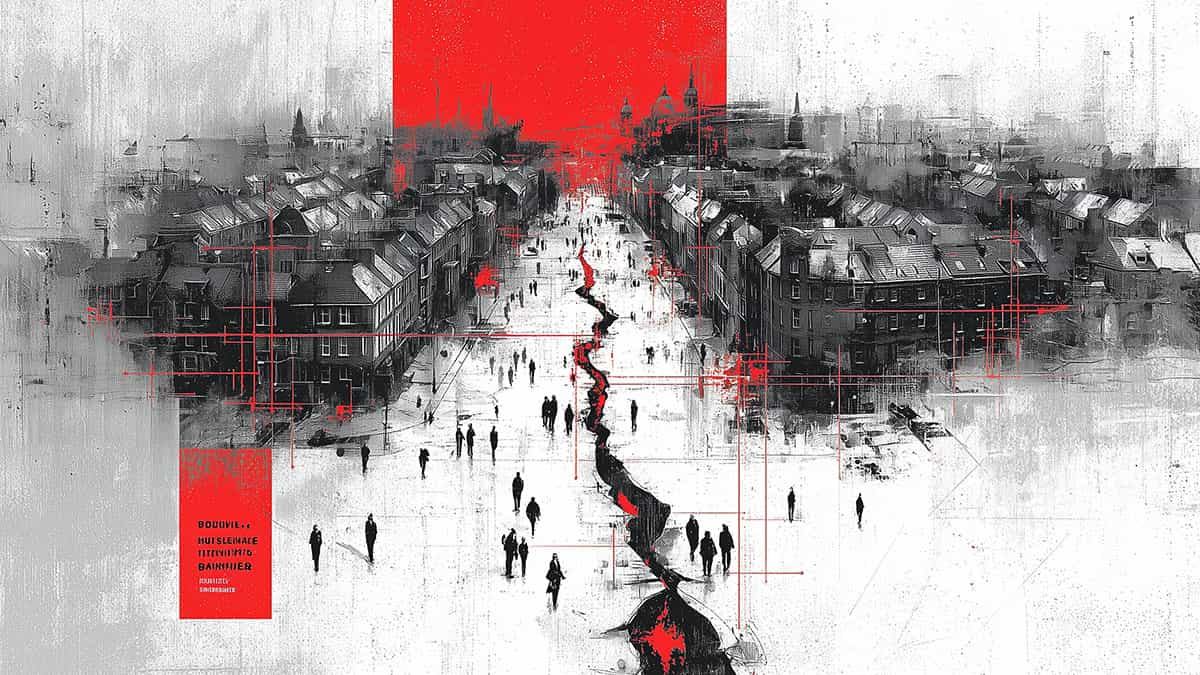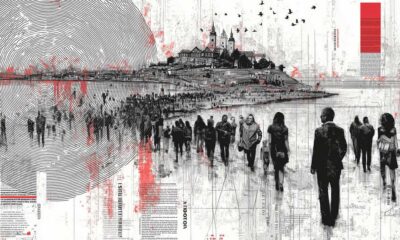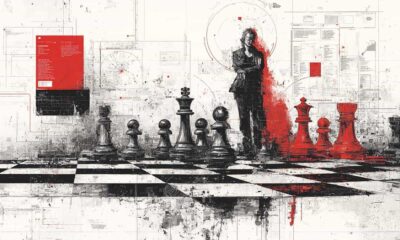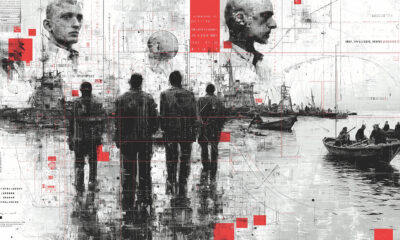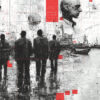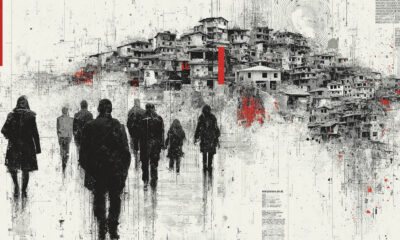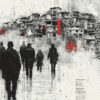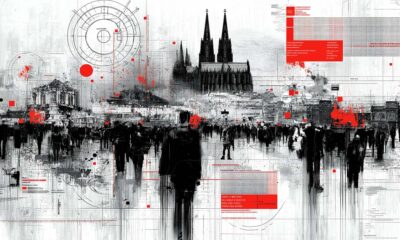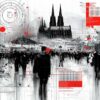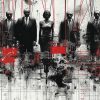Migration: Сrime, Сulture, Сrisis
Belgium Under Siege: How Drug Cartels and Migrant Gangs Are Tearing Apart a Nation
Today, the people of Belgium are facing a surge in crime caused by drug trafficking and organized crime. The port of Antwerp, a key entry point for vast cocaine shipments, drives violent gang warfare that spills into areas like Molenbeek and Borgerhout. For many civilians, the rising wave of shootings, grenade attacks, and brutal clashes—frequently tied to migrants and asylum seekers within these criminal networks— undermines their sense of security. With 41.5% of Belgium’s prison population in 2024 being foreign nationals, far exceeding their 19.6% share of the population, the significant role of migrants in grave offenses, from drug-related killings to sexual assaults, causes public fear and concern.
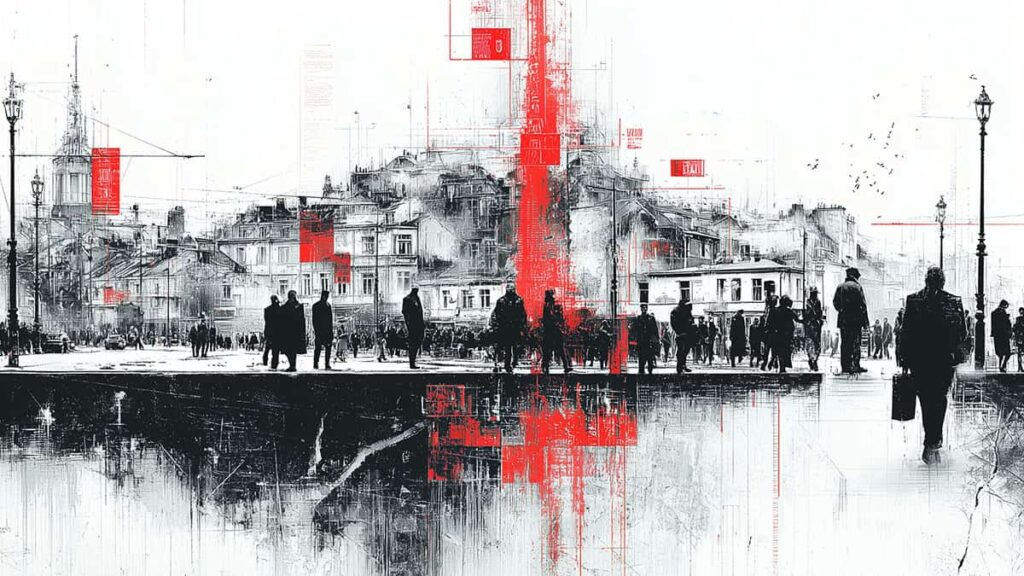
Drug Trafficking Trends
Belgium’s port of Antwerp is Europe’s leading entry point for cocaine, with record-breaking seizures underscoring the scale of the drug trade. In 2023, authorities seized 116 tons of cocaine in Antwerp, a 5% increase from 110 tons in 2022, alongside 5 tons in Zeebrugge, part of the Port of Antwerp-Bruges. In 2024, seizures dropped to 44 tons, a 62% decrease, suggesting traffickers may have shifted to more discreet methods, such as smaller shipments or alternative routes. For instance, Brussels Airport saw a fivefold increase in cocaine seizures in postal packages, reaching 130 kg by November 2024, compared to the previous year. Significant seizures include over 4 tons intercepted in Paraguay in July 2024, destined for Antwerp, and a 2025 operation seizing 780 kg in a joint Italy-Belgium effort.
Drug trafficking extends beyond cocaine to include cannabis and synthetic drugs. The Organized Crime Index notes expanding synthetic drug production in the Belgian-Dutch border region, with methamphetamine and amphetamine markets growing.
A significant milestone in combating drug trafficking occurred in October 2024, when a Belgian court convicted over 100 individuals in the country’s largest drug trial. The defendants, hailing from, Albania, Colombia, and North Africa, were part of a multinational cocaine and cannabis trafficking network active from 2017 to 2022. The trial, held in the former NATO headquarters in Brussels, resulted in sentences of up to 17 years for ringleaders, highlighting the severity of the issue. The case relied on evidence from cracked encrypted messaging apps like Sky ECC and EncroChat, revealing the sophisticated communication methods used by these networks.
Drug-Related Violence
The influx of drugs has fueled a surge in violent crime, particularly in Brussels and Antwerp. In 2024, Brussels recorded 89 shootings, a 43.5% increase from 62 in 2023, largely attributed to gang conflicts over drug trafficking territories. These incidents include Kalashnikov shootings from moving cars and grenade attacks, spreading fear to previously safe neighborhoods. Antwerp has faced similar violence, with 21 shootings in 2017 and ongoing grenade attacks since 2018, linked to the drug trade. The Mocro Maffia’s “Mocro-War,” sparked by a 2012 cocaine theft in Antwerp, has led to numerous gangland killings, with violence escalating in areas like Borgerhout, where the illegal economy overshadows legitimate commerce.
- Brussels Shootings (2024): Multiple shootings in neighborhoods like Molenbeek, with one incident involving rival migrant gangs using guns and machetes near Brussels’ main train station, resulting in one shooting and severe injuries.
- Antwerp Grenade Attacks: Ongoing since 2018, these attacks target drug-related rivals, with explosives used to intimidate or eliminate competitors.
- Public Figure Threats: In 2022, drug trafficking gangs threatened former Justice Minister Vincent Van Quickenborne with kidnapping, underscoring the audacity of these networks.
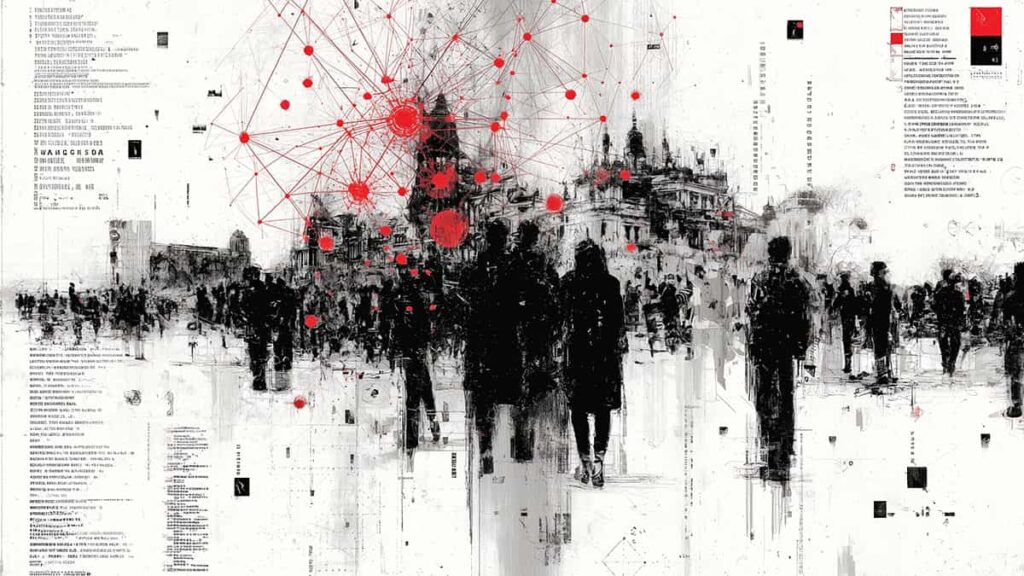
Organized Crime Networks
Belgium hosts a complex web of organized crime groups, with the Mocro Maffia, a Moroccan-Dutch syndicate, being the most prominent in the drug trade. Operating through clans like Turtle, Mixers, and El Ballouti, the Mocro Maffia controls significant cocaine imports via Antwerp. The Turtle clan, active since 2010, was linked to the 2012 theft of 200 kg of cocaine, igniting the Mocro-War, while the Mixers clan, operational since the early 2000s, was implicated in 2019 bomb attacks, with €10.2 million in assets seized in Morocco. The El Ballouti clan, led by Othman El Ballouti, has a net worth of at least €100 million and is involved in large-scale cocaine shipments, including an 11-ton consignment.
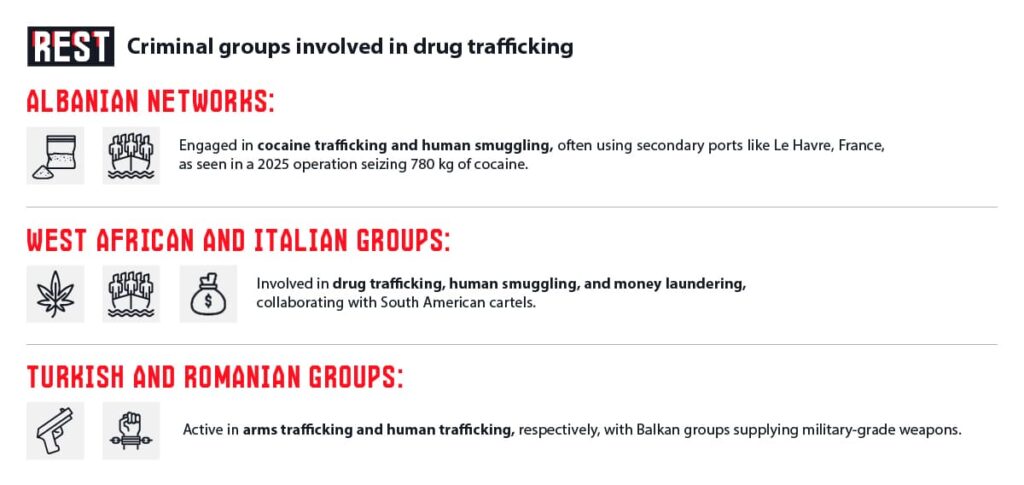
Europol’s 2024 report identifies 821 criminal networks across the EU, with 50% involved in drug trafficking and 70% engaging in corruption, many operating in Belgium with 112 nationalities represented. These groups use encrypted communication tools like Sky ECC, with decrypted messages revealing extensive drug operations, violence, and extortion.
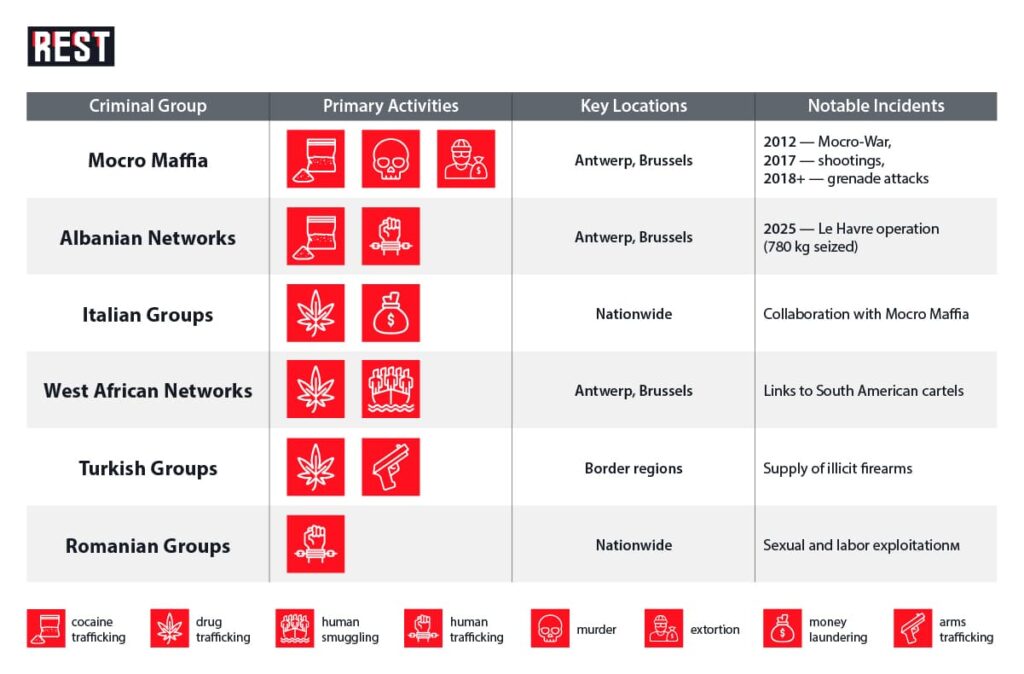
Migrant and Asylum Seeker Involvement
Foreign nationals, including migrants and asylum seekers, are significantly involved in drug trafficking and organized crime, as evidenced by prison data and specific incidents. In 2024, 41.5% of Belgium’s prison population were foreign nationals, despite foreigners comprising 19.6% of the population (1.3 million third-country nationals and 950,800 EU citizens). This overrepresentation (41.5% / 19.6% ≈ 2.12) suggests foreign nationals are incarcerated at more than twice their population share.
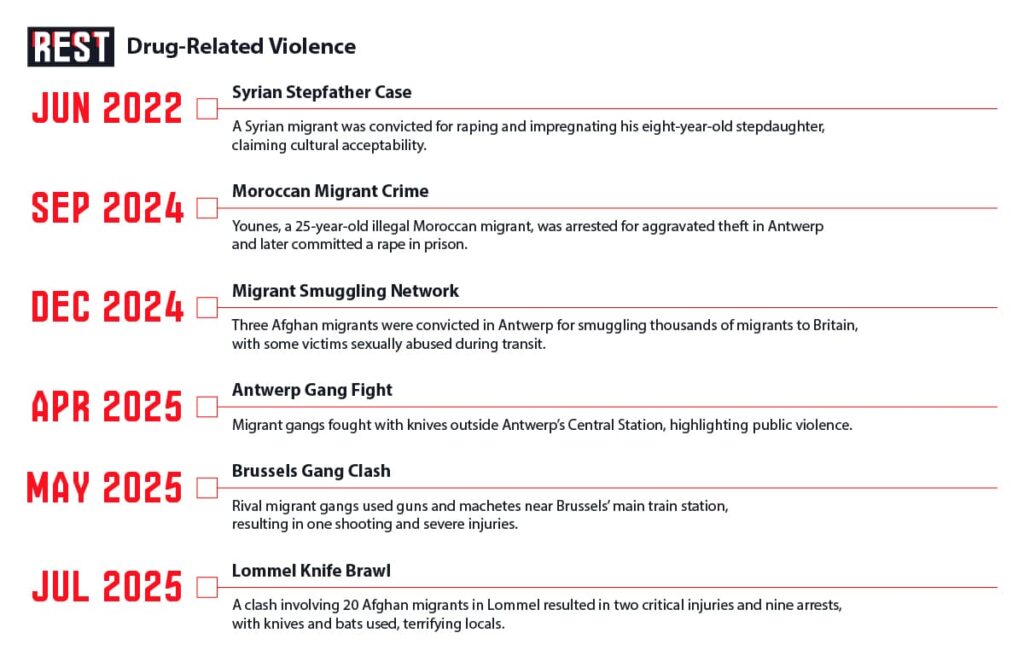
Belgium’s spiraling crime and violence, especially in cities like Brussels and Antwerp, have left local residents gripped by fear, as their once-safe neighborhoods are increasingly shadowed by the menacing activities of migrants and asylum seekers deeply entangled in drug trafficking and organized crime. The port of Antwerp, now Europe’s notorious cocaine gateway with a staggering 116 tons seized in 2023, has unleashed a wave of brutal violence, with Brussels enduring 89 shootings in 2024—a heart-wrenching 43.5% surge from the previous year— and migrant gangs such as the Mokro Mafia are directly involved. Prison statistics lay bare the chilling reality: 41.5% of detainees in 2024 are foreign nationals, a stark overrepresentation compared to their 19.6% population share, reflecting their outsized role in crimes from drug peddling to savage assaults. Harrowing incidents such as child rape and armed attacks strike at the heart of communities, leaving residents feeling vulnerable and betrayed. These escalating threats, fueled by international criminal networks such as Albanian and West African syndicates, are undermining the sense of security of ordinary Belgians, turning daily life into a continuous anxiety and requiring urgent action to counter the wave of crime caused by migrants, threatening the very fabric of the nation.


